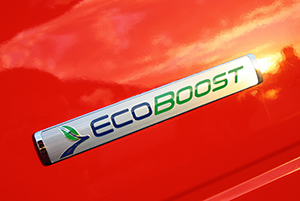
The National Highway Traffic Safety Administration is looking into nearly 100 complaints related to the performance of Ford Motor Co.'s popular EcoBoost engine. Consumers driving the turbocharged V-6 in F-150 pickups allege "unexpected, sharp reductions in engine power during hard accelerations at highway speeds," according to NHTSA.
Since the 3.5-liter V-6 was introduced in 2011, Ford has issued three technical service bulletins to dealers explaining how to fix acceleration problems, but it has not yet initiated a recall. Roughly one-third of the complaints report weak acceleration problems at highway speeds in rainy, wet conditions.
The most recent bulletin, issued this past March, tells dealers how to diagnose moisture accumulation in the charge-air cooler, a heat exchanger that cools down compressed air before it reaches the combustion chamber. The bulletin also explains how to reprogram the powertrain control module, install a new charge-air cooler and replace the air-deflector plate.
"The majority of these vehicles are expected to still be under warranty," says Kelli Felker, Ford spokeswoman.
Around 400,000 F-150 trucks sold between 2011 and 2013 could have the problem, NHTSA reports. More than 40% of all new F-150 trucks are sold with the V-6 EcoBoost engines, which are designed to use turbochargers and direct injection to deliver V-8-like power and torque with the fuel-economy rating of a V-6.
When ENR reviewed the EcoBoost F-150 in 2010, we found that the turbocharged V-6, which came at a $1,750 premium over the base V-6 engine, exhibited impressive performance and fuel economy. However, we advised buying a naturally aspirated V-6 or V-8 due to the lower service costs.
In addition to NHTSA's probe, a class-action lawsuit filed earlier this month in Ohio alleges that moisture accumulating in the charge-air cooler and pulled into the engine causes it "to shudder, shake violently, rapidly lose power or go into limp mode."
NHTSA notes that it has not yet received any reports of accidents stemming from the alleged engine problems. Ford says it is cooperating with the probe.




Post a comment to this article
Report Abusive Comment